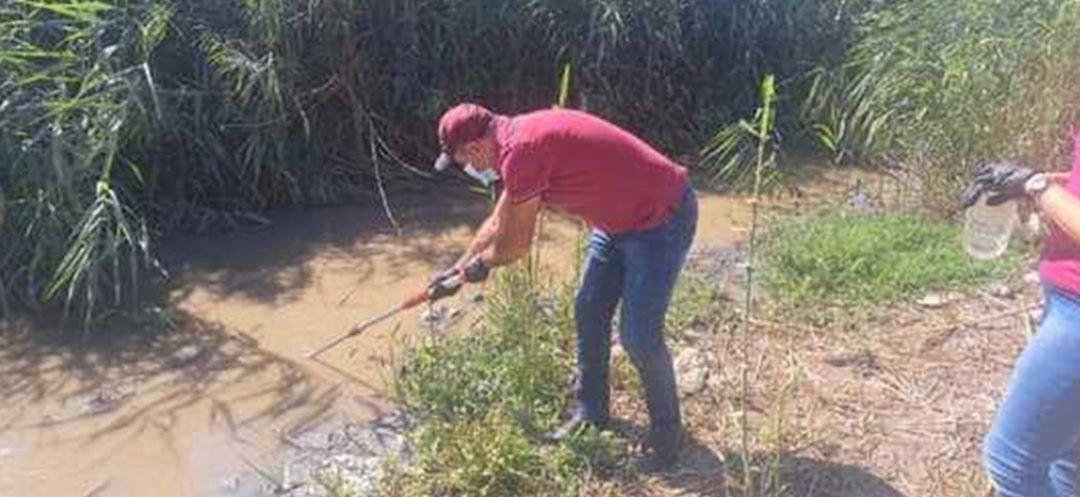
The National Litani River Authority announced that it detected cholera bacteria in the river’s waters, in the upper basin, during its regular sampling checks at random and predefined sites. However, there is no need to panic or fear an epidemic, at the moment, according to an infectious disease specialist.
In a statement released on Friday, the Authority emphasized that waters contaminated with cholera bacteria are the main cause of the spread of the disease, especially since the river, particularly in its upper basin, continues to receive untreated sewage contaminated with various types of bacteria.
Cholera is an acute diarrheal infection caused by ingesting food or water contaminated with the vibrio cholerae bacteria.
Sampling Results
On September 9, 2024, the National Litani Authority collected water samples from seven points of the Litani River in its upper basin to monitor any cholera contamination. These samples were analyzed in its laboratory in Khirbet Kanafar.
The results revealed the presence of cholera bacteria in two locations: the sewage collection point in Chtaura and the Litani River at the Dalhamieh bridge, according to the statement.
It should be noted that these two points had already shown signs of contamination during the spread of the epidemic in 2022.
In this context, the National Authority warns against the current situation of the river and calls for the immediate cessation of all activities that could worsen its condition or cause a new epidemic.
"Once cholera bacteria reach surface waters, they can spread to all points, posing a serious danger to the health of all residents in the upper basin of the Litani River," the statement reads.
No Need to Panic
Contacted by This Is Beirut, Dr. Elie Haddad, an infectious disease specialist at Hôtel-Dieu de France, emphasized "there is no need to panic, and it is still too early to talk about an epidemic, although cholera can spread very quickly." He explained that these are "sporadic cases." "We can only talk about an epidemic when more than a hundred cases are detected per day across the entire Lebanese territory, which was not even the case in October 2022."
Dr. Haddad also stated that "the spread of cholera can be stopped if maximum precautionary measures are taken." He highlighted the importance of hygiene, including "adding chlorine to water tanks, washing hands thoroughly, and properly cleaning fruits and vegetables." Questioning the effectiveness of using vinegar for cleaning vegetables, Dr. Haddad suggested it is more useful "to use products containing chlorine that are balanced and non-toxic to the body, which are easily found in pharmacies and supermarkets." Finally, he emphasized the importance of "screening as soon as symptoms appear and vaccination at the national level."
The 2022 Cholera Epidemic
In October 2022, a cholera epidemic broke out in Lebanon. It was likely the result of a severe outbreak in neighboring Syria, which itself was linked to contaminated water from the Euphrates River.
This epidemic marked the first incidence of cholera in Lebanon since 1993.
By December 9, 2022, 5,105 suspected and confirmed cases of cholera had been reported, along with 23 associated deaths.
In June 2023, the Lebanese Ministry of Health announced the end of the cholera epidemic that began in October 2022.
In a statement released on Friday, the Authority emphasized that waters contaminated with cholera bacteria are the main cause of the spread of the disease, especially since the river, particularly in its upper basin, continues to receive untreated sewage contaminated with various types of bacteria.
Cholera is an acute diarrheal infection caused by ingesting food or water contaminated with the vibrio cholerae bacteria.
Sampling Results
On September 9, 2024, the National Litani Authority collected water samples from seven points of the Litani River in its upper basin to monitor any cholera contamination. These samples were analyzed in its laboratory in Khirbet Kanafar.
The results revealed the presence of cholera bacteria in two locations: the sewage collection point in Chtaura and the Litani River at the Dalhamieh bridge, according to the statement.
It should be noted that these two points had already shown signs of contamination during the spread of the epidemic in 2022.
In this context, the National Authority warns against the current situation of the river and calls for the immediate cessation of all activities that could worsen its condition or cause a new epidemic.
"Once cholera bacteria reach surface waters, they can spread to all points, posing a serious danger to the health of all residents in the upper basin of the Litani River," the statement reads.
No Need to Panic
Contacted by This Is Beirut, Dr. Elie Haddad, an infectious disease specialist at Hôtel-Dieu de France, emphasized "there is no need to panic, and it is still too early to talk about an epidemic, although cholera can spread very quickly." He explained that these are "sporadic cases." "We can only talk about an epidemic when more than a hundred cases are detected per day across the entire Lebanese territory, which was not even the case in October 2022."
Dr. Haddad also stated that "the spread of cholera can be stopped if maximum precautionary measures are taken." He highlighted the importance of hygiene, including "adding chlorine to water tanks, washing hands thoroughly, and properly cleaning fruits and vegetables." Questioning the effectiveness of using vinegar for cleaning vegetables, Dr. Haddad suggested it is more useful "to use products containing chlorine that are balanced and non-toxic to the body, which are easily found in pharmacies and supermarkets." Finally, he emphasized the importance of "screening as soon as symptoms appear and vaccination at the national level."
The 2022 Cholera Epidemic
In October 2022, a cholera epidemic broke out in Lebanon. It was likely the result of a severe outbreak in neighboring Syria, which itself was linked to contaminated water from the Euphrates River.
This epidemic marked the first incidence of cholera in Lebanon since 1993.
By December 9, 2022, 5,105 suspected and confirmed cases of cholera had been reported, along with 23 associated deaths.
In June 2023, the Lebanese Ministry of Health announced the end of the cholera epidemic that began in October 2022.
Read more



Comments